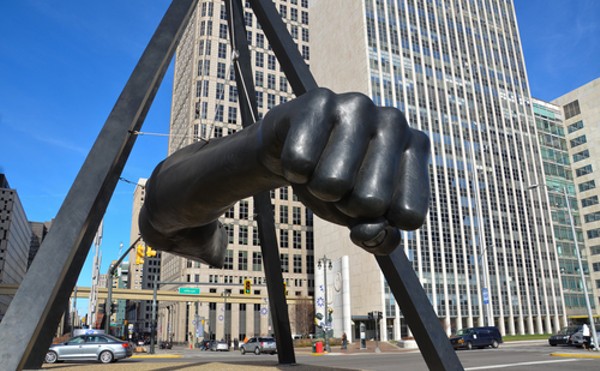Spurred in part by the 2006 Super Bowl, nearly 2,000 new hotel rooms are slated for construction in downtown Detroit, with another 600-plus under consideration. Such development begs questions, chief among them being whether the market can support the doubling of downtown rooms in the long term. And are the taxpayers at risk if the new hotels are not viable over time?
The Center for Urban Studies at Wayne State University pegs downtown hotel occupancy at 56 percent. That’s already below the 59 percent national average.
The renovation of the Holiday Inn Express & Suites brings the number of available downtown hotel rooms to 2,753. Another 1,968 are guaranteed to open by 2005. Construction of 633 more are currently being considered. That means downtown Detroit could boast 5,354 rooms by the time Super Bowl XL comes to town in February 2006.
Historic Hospitality Investment LLC and Marriott are renovating the 478-room Book Cadillac. The partnership will also offer 95 condominiums, shops, restaurants and 60,000 square feet of meeting space. Harmonie Park is also getting a new crash pad, thanks to the 198-room Hilton Garden Inn, which is nearing completion.
Other hotels are in various stages of financing. First Lafayette LLC wants to erect a 275-room Holiday Inn Select at the site of the historic Hotel Fort Shelby, located on the western fringe of the Cobo Center business district. A Staybridge Suites in the same area would provide 125 rooms, and there is interest in developing warehouse space at Ford Field into 230 hotel rooms.
Detroit’s three casinos, meanwhile, are each committed to building their own 400-room hotels.
Detroit is counting on being beautified and edified by the time the Super Bowl arrives. City officials say the town will be a resurgent metropolis, and the visibility provided by the game will turn Detroit’s image from negative to positive overnight. In the meantime, they feel the key to filling the hotels and keeping them viable over the long term lies in attracting conventions and new businesses.
“If you can show that the hotels are going to be delivered in the short range of two to four years,” says Peter Zeiler, business development representative for the Detroit Economic Growth Corporation, “I think you’re going to see the conventions hit the market at the same time, because most conventions are booked two to four years out.” Zeiler says lack of downtown hotel space causes Detroit to lose many convention bookings.
The NFL requires Super Bowl host cities to provide 17,500 hotel rooms within a 60-mile radius. Detroit’s tri-county area offers 35,000.
So why is Detroit bent on building so many more in time for the game?
“To keep most of the economic activity in the city proper,” says Walter Watkins, chief development officer of the Detroit Planning and Development Department.
Watkins says those developing hotels downtown “have done their own market studies which suggest there’s a demand for downtown rooms.”
Developers do seem confident that Detroit will be a different city in the near future — but if they’re wrong, will taxpayers have to pay for the mistake?
Zeiler says loans given to some of the developers come from tax money “that’s already been collected. In terms of future liability to Detroit taxpayers, there’s none. If a project goes belly-up, no one has to pay it back.”
First Lafayette is applying for a Brownfield Single Business Tax Credit to help build the Holiday Inn Select. The state tax credit is worth 10 percent of project costs. The Ford Field hotel and the Staybridge Suites are in negotiation, so there are no incentives defined now.
The Hilton Garden Inn, however, has received a market-rate loan from the Downtown Development Authority and the Detroit Investment Fund. The DIF is a private organization that draws money from the corporate community and foundations. DDA funds are available for second-position loans. If the property defaults, DDA will not be at the top of the list of creditors.
The three casinos were originally expected to build 800-room facilities, but ultimately agreed to facilities half that size. Is that because there isn’t enough tourism?
“The number that we settled on is the number we felt the market can support,” says Roger Martin of Rossman-Martin & Associates, public relations representatives for Greektown Casino. “You look at current visitation to the city and project what might occur based on what might happen. We then develop in a way that might accommodate future development.”
Martin says Greektown took into consideration the interest shown by other companies and other projects (i.e. the Hilton Gardens, the Riverfront projects, the Super Bowl).
“Once you have a hotel attached to a permanent [casino] facility, visitors come from farther away, and they’ll want to spend the night,” Martin says.
Some experts see the logic in Detroit’s plan, but they also express concerns regarding its certainty.
“Building additional hotels gives the city an opportunity to attract larger conventions and conferences,” says Pat Rishe, an assistant professor of economics at Webster University in St. Louis. “But to improve Detroit as a destination, the city must continue to improve the aesthetics of their central business district, and create and promote more visitation areas within the central business district.”
Rishe adds, “My only concern for Detroit’s expansion of hotels is that they better address the issue of creating more visitation areas downtown, along with improving the degree of connectedness of these areas. Otherwise, there will be a lot of vacant hotel rooms in downtown Detroit.”
Rishe cites Denver and Indianapolis as examples of cities that have revitalized their downtowns and improved their images by increasing their hotel availability. Both cities have shops, restaurants and tourist destinations that connect key visitation points. They also have vibrant convention centers, entertainment and business districts. Clean, relatively secure streets encourage foot traffic.
“Having had to walk from Comerica Park to the Detroit Convention and Visitors Bureau,” says Rishe, “it is my opinion that there are presently not enough key visitation points within the downtown region, and that the means by which one can travel from point to point is not as convenient as in other cities.”
Hotels that depend on attractive surrounding areas and don’t have the lure of a casino normally base their profitability on three factors: average daily occupancy, average number of occupants at any given time, and the cost per room for construction and maintenance. All interact and determine a hotel’s viability.
“Measure numbers in the industry,” Bill Hanley, executive vice president of the American Hotel and Lodging Association, advises. “For every $10,000 in the cost of [building] a room, you need to get $10 in average rate. If you’re in a multiuse site with retail, the number may be lower, because you’d have rents [paid by tenants] to offset it.”
If not, each hotel better have a sufficient client stream and room rates competitive enough to meet costs and make a profit.
Building hotels while rebuilding the image of a city seems complicated, but Hanley says it not uncommon.
Patti Shock, chair of the Convention and Tourism Department at the University of Las Vegas Nevada, sees image as Detroit’s biggest obstacle. “Detroit needs to do some heavy PR to combat the negative image painted by the press over the years,” she says. “Atlanta did this in the mid-’70s and became a convention powerhouse.”
Kurt Metzger, research director at Wayne State’s Center for Urban Studies, believes city officials are in a good position, but that it is not without risks. “In order for Detroit to be considered a player, it has to have a core, produce hotels and restaurants, and bring in entertainment.”
He notes that the developers of new hotels are “not gonna lose money; the city is going to have to attract folks, work with the convention bureau. Detroit has to step up, it’s long overdue. But it’s not going to happen overnight.”
Khary Kimani Turner is a Metro Times staff writer. E-mail [email protected]




